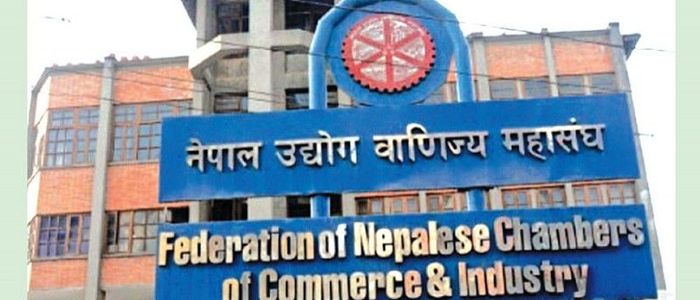- Monday, 15 December 2025
Private business community suggests govt to focus on demand creation
By A Staff Reporter,Kathmandu, May 12: The Federation of Nepalese Chambers of Commerce and Industry (FNCCI) has suggested the government to bring a budget for the upcoming fiscal year 2025/26 by including an investment-related integrated body and law, investment decade, local production growth and import substitution and policy stability.
At the pre-budget interaction for the fiscal year 2025/26 organised by the Federation on Sunday, FNCCI President Chandra Prasad Dhakal handed over suggestions to Deputy Prime Minister and Finance Minister Bishnu Prasad Paudel on behalf of the Federation.
Accepting the suggestions of the Federation, Deputy Prime Minister and Finance Minister Paudel expressed his commitment to include as many suggestions as possible and appropriate in the budget.
Stating that it is right for the private sector to demand political and policy stability for the development of the economy, DPM Paudel said that the current government is ready to listen to the suggestions of the private sector and work accordingly for policy stability.
“The government is clear that the country's economy will not move forward without attracting investors. Therefore, this government has been discussing with the private sector from the beginning to accelerate the sluggishness of the economy and has made policy reforms through an ordinance. But that is not enough. We will gradually improve,” DPM Paudel said.
Submitting suggestions, FNCCI President Dhakal suggested that this time's budget should include some important and far-reaching issues to reduce the complex international environment, address the country's needs and the frustration of the general public.
He suggested that the focus of the upcoming budget should be on increasing development spending by reducing general expenditure and increasing the purchasing power of the general public and the production and productivity.
The trend of only allocating about 17 per cent of the budget for capital expenditure and spending only about 60 per cent of it has not led to the expected development and the private sector business has also been affected due to low demand in the market.
The FNCCI has suggested that the budget size should be increased at the same rate as the revenue growth when determining the size of the budget for at least next two years.
Stating that the private sector has been discouraged due to the inability to make investments despite the possibility for various reasons, he suggested declaring 2025-35 as an investment decade to increase domestic and foreign investment.
“Overall, the main reason why Nepal is lagging behind even though a country like ours has made a leap in development is that the government, domestic private sector and foreign investment are very low. Therefore, unified laws related to investment, a single facilitation regulatory body and unified services are the first necessity,” said Dhakal.
Foreign investment has come in at only 0.2 per cent of the gross domestic product, and in such a situation, he urged the government to declare 2025-35 as an investment decade in the upcoming budget that covers all sectors.
President Dhakal suggested that budget should include aspects such as expansion of an open economy with social justice, structural changes for a new phase of economic reform, promotion of the private sector, enhancement of good governance, and efficiency of revenue mobilization and public expenditure in its objectives and priorities.
Dhakal said that as Nepal has abundant potential for tourism, the budget should be designed to develop tourism.
He suggested providing access roads and electricity facilities to hotels, resorts, polytechnic institutes, other educational institutions, and teaching hospitals to be established in hill stations, and providing a 50 per cent exemption on income tax for the first five years.
The Federation has suggested that a unified investment-related law should be formulated to ensure policy transparency and business security by reforming laws such as land, forest, environment, public procurement, minerals, and hydropower, which are obstacles to investment.
The FNCCI has suggested that the maximum income tax rate for individuals should not exceed 30 per cent including surcharge, the income tax exemption limit should be Rs. 800,000 for individuals and Rs. 1 million for couples.
Similarly, in a situation where the implementation of the VAT rate is complex, the FNCCI has suggested that the maximum rate could be kept at 13 per cent, indicating the possibility of moving to a reduced rate, and that a lower rate could be set for priority and concessional sectors.

















